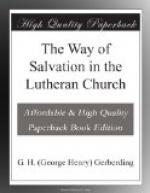But this, perhaps, is a digression. Let us understand clearly what we mean by sanctification. The English word comes from a Latin word that means sacred, consecrated, devoted to holy purposes. The Greek word translated sanctify in our English Bible also means to separate from common and set apart for holy purposes. The same word that is translated sanctify, is in many places translated consecrate, or make holy. The English word saint comes from the same Latin root, and is translated from the same Greek root, as sanctify. It means a sanctified one, or one who is being sanctified. Thus we find believers called saints, or sanctified ones. We find, indeed, that the apostles call all the members of their churches saints. Thus they speak of “the saints which are at Jerusalem,” “The saints which are at Achaia,” “To all that be in Rome ... called to be saints,” “As in all the churches of the saints.” So in many other passages.
In harmony with the apostolic usage, we confess in the Apostles’ Creed: “I believe in the Holy Christian Church (which is) the communion—or community—of saints.” If then saints means sanctified ones, or holy persons, do not the Bible and the Apostles’ Creed demand perfect sinlessness? By no means. Christians are indeed to strive to constantly become more and more free from sin. They are “called to be saints,” are constantly being sanctified or made holy. But their sanctity or holiness is only relative.
They have indeed “come out from the world,” to “be separate.” They are “a peculiar people.” They hate sin, repent of it, flee from it, strive against it, and overcome it more and more. They “mortify the deeds of the body,” “keep it under,” “crucify the flesh with its affections and lusts,” “present—(or consecrate)—their bodies, as living sacrifices to God.” They have pledged themselves at Christ’s altar to “renounce the devil and all his works and ways, the vanities of the world and the sinful desires of the flesh, and to live up to the doctrines and precepts of Christ.”
In so far, they are separated from the world, set apart to become holy, consecrated to Christ. Not that their sanctification or saintship is complete. If that were the case, the apostles would not have written epistles to the saints. For perfect beings need no Bibles, no Churches, no means of Grace. The angels need none of these things. There is indeed not one sinless person mentioned in the Bible, except that divine One, “who did no sin, neither was guile found in His mouth.”




